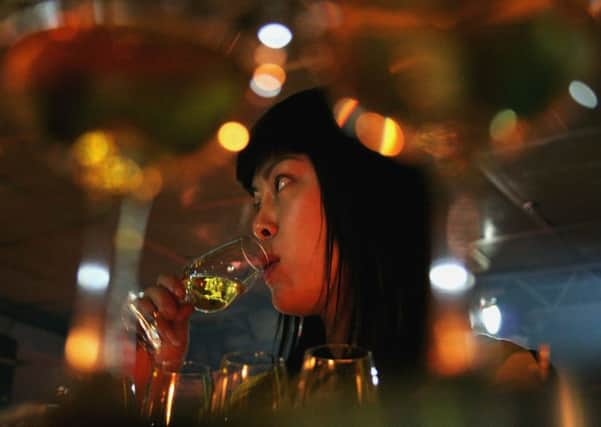Tackling the trade in fake Scotch whisky


On a personal mission for the Scotch Whisky Association (SWA), Park, the organisation’s senior legal counsel, took the opportunity to trawl Argentina’s supermarkets and convenience stores to gauge the state of the fake Scotch whisky market in the South American country.
“We found one product on the market which will require to be removed from sale,” says Park, who has already set his lawyers on the case.
Advertisement
Hide AdAdvertisement
Hide Ad“It was a whisky which was not Scotch, branded as ‘William Wallace’ whisky”. He pauses. “William Wallace, that well-known Argentinean.”
While he found the whisky market in Argentina to be “fairly clean”, he is always keen to stamp out any fraud, which could impact on the lucrative legitimate Scotch whisky market.
Worth almost £4 billion to the Scottish economy, Scotch whisky accounts for a quarter of the UK’s food and drink exports.
It is also a product that many people worldwide are keen to replicate – and cash in on the drink’s international cache and subsequent monetary value.
The SWA’s legal team are, at any one time, handling between 60 to 70 cases dealing with Scotch whisky fraud, with new proceedings authorised in respect of 19 different brands in 2014 alone. In addition, the team deals with trademark infringements, which attempts to block use of trademarks which are likely to deceive purchasers as to the origin of the goods.
Park spends a great deal of his time battling with whisky manufacturers in other countries as to what does – and doesn’t – constitute marketing a product as Scotch.
Last year, an alcoholic drink appeared on the Bulgarian market that attracted the attention of Park and his colleagues.
Crudely designed, with a bright yellow label depicting a bagpiper in full Highland dress standing in front of Eilean Donan Castle near the Kyle of Lochalsh, this “Grain Alcoholic Drink with Malt” was called “Highlander”.
Advertisement
Hide AdAdvertisement
Hide AdThe product, manufactured by Bulgarian company Nordix, did not technically claim to be Scotch. But Park was suspicious.
“They argued that plenty of countries have Highlands, not just Scotland, which is true,” he said. “They also claimed that other countries have an association with the bagpipes. What we had to prove was that when you put a piper dressed in tartan standing in the Highlands on a bottle of whisky – a product with a close association with Scotland – Bulgarian consumers are going to believe it is Scotch.”
His suspicions were justified. A market survey carried out in Bulgaria showed that 91 per cent of consumers believed the product to be a whisky – with more than half saying they had assumed it was specifically a Scotch whisky. Nordix, however, did not agree. Legal moves to block the drink resulted in the Sofia firm attempting to argue that neither the name Highlander, nor the image of a bagpiper, had any special association with Scotland.
Eventually, a settlement agreement was reached in which Nordix agreed not to use the name Highlander, figures of Scottish Highland dress and images of tartan or bagpipes and the name was removed from the Bulgarian trademark register.
Meanwhile, in China, a judge at the Anqing Intermediate People’s Court, on the northern shore of the lower Yangtze river, recently ruled that bottle caps imprinted with the word “Scotch Whisky” were intended for use on the black market – even though no complete bottles had been found. Normally the SWA sues after demonstrating that the liquid inside the bottle is not Scotch. However, the caps were used on bottles of fake “Scotch” appearing on sale more than 1,000 miles away in Myanmar – a trick used by counterfeiters to geographically separate packaging and fake whisky in a bid to avoid detection.
The ruling was the latest victory in the industry battle against fake Scotch – and the first time the industry body had successfully concluded proceedings in the Chinese civil courts, issuing a warning shot to would-be counterfeiters in the country.
Just a few days earlier in the Cameroonian city of Yaoundé, Scotch Whisky was registered as a geographical indication (GI) – a whisky produced in Scotland in accordance with UK law – in the 17 member countries of the Organisation Africaine de la Propriete Intellectuelle, which includes countries such as Burkina Faso, Cameroon and Senegal.
Indeed, the SWA’s battle is not over in China, one of the fastest-growing whisky markets in the world. A total of 31 trademark infringements in the country were being battled in 2014, according to the latest annual report compiled by the SWA, with only 13 outstanding in the territory of the next most prolific culprit: the US.
Advertisement
Hide AdAdvertisement
Hide Ad“The Chinese authorities act quickly when there are issues, which is more than we can say for some western countries,” Park says, pointing to the situation in Australia, where deregulation of the specification of spirits has caused problems for the SWA’s members.
“There were 40 brands of fake Scotch on sale and 16 legal procedures – I think that’s been the worst level of fake Scotch in one country for years.”
In some countries, there are also problems with old bottles from the real product being refilled with a non-Scotch whisky.
“The market needs to know what it’s buying,” explains Park. “People associate Scotland with high quality whisky and if that wasn’t the case, we’d be in danger of losing market share and of becoming generic, like cheddar cheese. Cheese does not have to be made in the town of Cheddar to be called cheddar and that is not what we want for Scotch.”
He adds: “While exports are extremely important on a financial basis, what is most important is the jobs and the heritage, especially in rural communities that are wrapped up in Scotch whisky.”